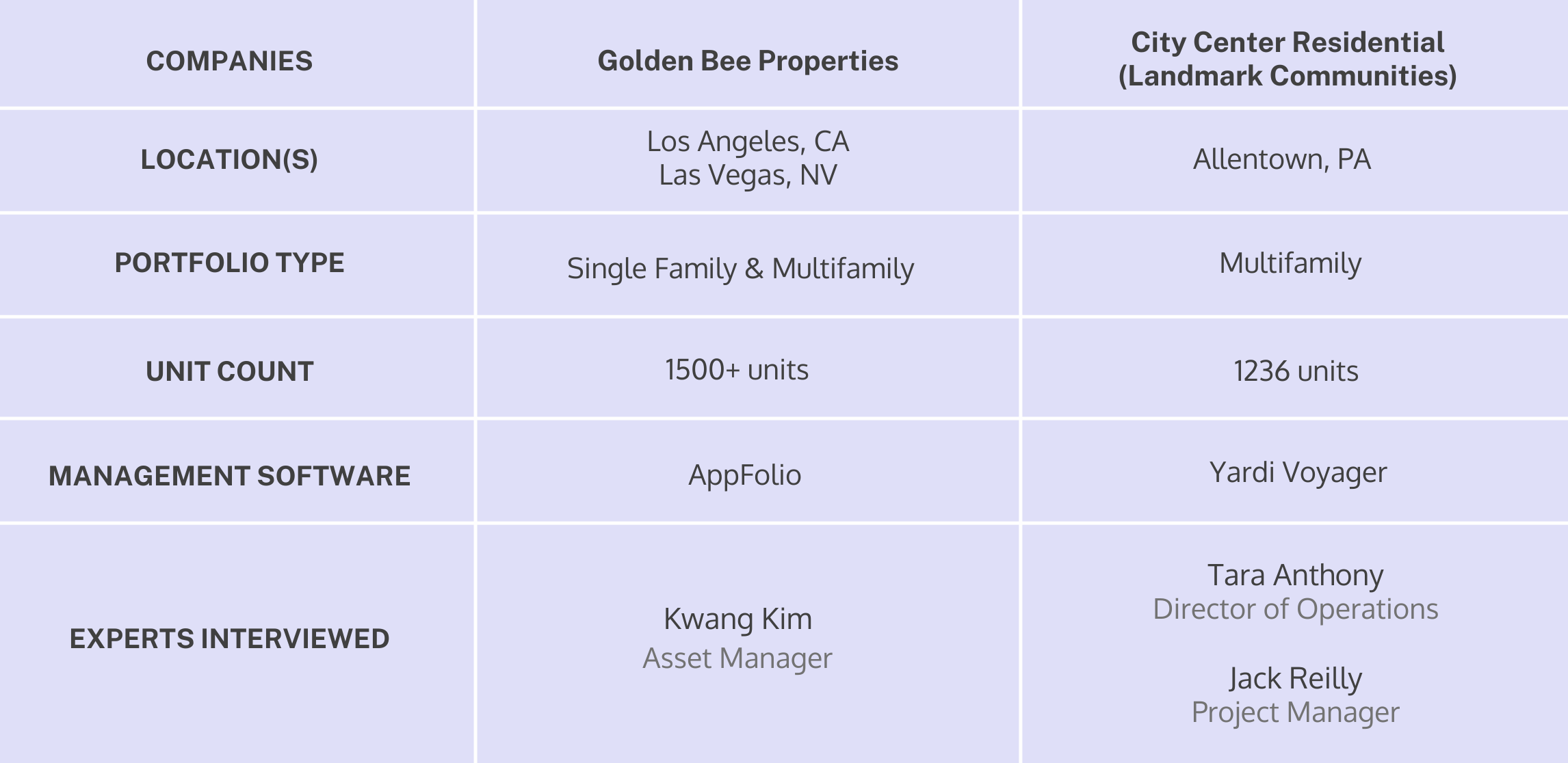Real estate technology is advancing rapidly. New products promising to make lives easier for property managers emerge all the time. It can be hard to keep up, so we invited guests from two property management companies to share how they prioritize and evaluate technology solutions.
The Property Management Companies

What’s in a property management tech stack?
It’s not surprising to hear from these companies that their tech stacks are all sitting on a firm basis: their core property management software. We’re talking about the “usual suspects”: AppFolio, Buildium, Yardi, MRI, RealPage, Entrata, Rent Manager and others. Property management software provides a centralized platform for daily operations, from tenant and leasing tracking to accounting and building maintenance.
“AppFolio is our main database — all our work flows through it,” said Kwang Kim, Asset Manager at Golden Bee Properties.
Besides the property management software, technology is also used to enhance the resident experience, from lease signing to actually living in the units. Golden Bee Properties started using contactless technology for showing units and signing leases during COVID, but has now adapted them into the day-to-day operation.
Landmark Communities installed an array of tech-enabled services inside their City Center Residential buildings, such as smart package lockers, digital Yale locks, building access systems, security cameras, and even electric vehicle chargers in their parking garages. They also use a number of Yardi Voyager’s built-in services, such as a rent maximizer, a concierge service for residents to reserve amenity spaces, and RentCafe.
Top factors to consider in new proptech solutions
Every product offers different values, but there are three guiding questions that property managers ask first when they evaluate a new tech solution:
1. Does it integrate?
Integration with the existing property management system is the first and foremost factor to consider. A fully integrated solution means property managers can “plug and play” without wasting time on tedious administrative tasks.
“Integration is very important to us since we are trying to flow everything through one system. We try to stick to programs or companies that work together with AppFolio,” Kwang said.
Jack Reilly, Project Manager at City Center Residential, shares the sentiment. Whenever a new software is getting rolled out in a new building, he and Tara Anthony, Director of Operations, need to make sure the system is able to pull directly from Yardi, with either a direct integration or a format changing document that allows information sharing between the two systems.
“We want to make sure that we’re using Yardi to the best of our abilities. Some solutions require a lot of effort to implement, and we just don’t select something that requires us to manually enter all the data,” Jack said.
In fact, integration is one of the main reasons Landmark Communities chose to partner with Obligo. The fast implementation and seamless integration with Yardi Voyager means that new residents are automatically invited to live deposit-free or pay a traditional deposit electronically.
2. Is it easy to use?
The technology behind a product can be complex, but the solution needs to be easy and intuitive to be successfully adopted. Property managers don’t want to spend time training staff to use overly complicated systems that bring more trouble than they’re worth.
“If an app is too complex, we might decide that it’s not for us at this time. The bottom line is, we have to be able to use it properly and to get all the features out of it.” Kwang said.
“We want to save people’s time and make sure they’re able to click three buttons and have the report they need right in front of them,” Tara said. “It’s really about being able to navigate and feel comfortable in a system that we use regularly.”
3. How’s their customer service?
Sometimes, the people that help implement a new solution are just as important as the solution itself. Kwang has tried quite a few products that seemed interesting initially but couldn’t bring real value in the end because there wasn’t proper training and onboarding from the product side.
“The people we talk to and the customer service they provide are very important to us,” Kwang said.
How property managers maintain their tech stack
Maintaining a well-functioning rental tech stack is a long-term project. Thorough research for new products and frequent re-evaluation of existing ones are needed to make sure the solutions you have are up to date and delivering real value to your owners, residents, and staff.
Sourcing
While all three operators agree that planning long-term and building technology into their companies’ strategic vision is the goal, in practice they often need to move fast and source new solutions as problems occur.
Kwang and his team at Golden Bee Properties would go to conferences and trade shows to connect with proptech companies and try out their products. “There are so many companies out there that are making things easier. They’re tackling the little bits and pieces of the whole property management puzzle, which is very useful for us,” Kwang said.
City Center Residential has been opening new buildings consistently for the last 7.5 years, so Jack and Tara have ample resident feedback to help them stay agile and implement new solutions when needed. They also need to make sure that in the long term, any new technology introduced will benefit all of their buildings.
Evaluation
To ensure a proptech solution is delivering the value it needs to, frequent re-evaluation is critical. Operating teams at City Center Residential will meet monthly to look at data on lead generation, conversion, and sometimes return on investment. But their single most important metric is whether the technology is saving time for their staff. In Obligo’s case, our deposit-free technology helped Tara’s team reduce the time they spend on deposit-related tasks by 96%.
“Our priority is to let our staff spend time where their human touch is so important,” Tara said. “We want to free up their time so they can really focus on what they’re here to do — touring, sales, phone calls, scheduling appointments, signing leases and assisting residents.”
Based on these criteria, Tara, Jack and team will make quarterly decisions on whether to continue using or discontinue a product. “We really try to keep an eye on those things on a regular basis, and we don’t let things go by for six months or a year before we re-evaluate,” she added.
Resident attitude toward proptech
Many proptech services are put in place to provide a better experience for residents. So how do they feel about the myriad of technology available to them?
Residents at City Center Residential are happy they have tech-enabled systems and products to make their lives easier, Tara said. In fact, residents from older buildings would ask the staff about feature upgrades and sometimes even request a transfer to live in the newer buildings with better technology. One of the products that these residents provided great feedback for is Obligo’s deposit-free solution and the financial flexibility it offers.
“It’s incredibly important to know your current renters and future renters. All of them will want a form of technology, so it’s definitely worthwhile to get ahead of it now before your competition does,” Tara said.
Meanwhile, Kwang sees a mixed attitude. While some of Golden Bee’s residents would pick up on new technology right away and love the convenience, others — especially older residents — still prefer to do things traditionally, such as sending written checks and talking to someone in person rather than going through an online help portal. In these cases, residents simply require a bit more hand holding as they adapt to new technology.
Kwang is bullish on proptech. “We’re constantly looking at ways to become more efficient, and technology is obviously the way to go,” he said. “We’re still relatively small, but we are expanding, so being able to communicate in an efficient manner and have everything all in one space is very important for us.”






Leave a Reply